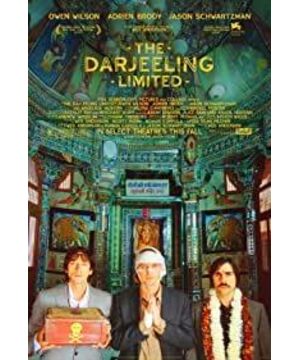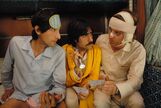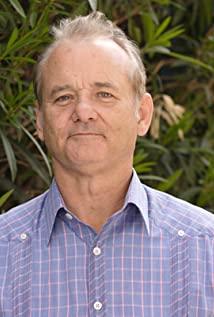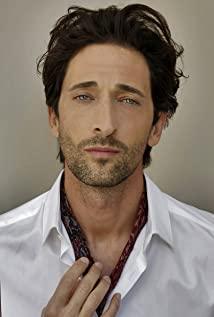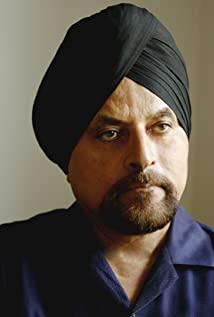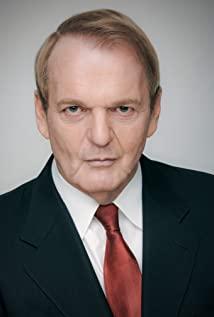Wes Anderson prefers bright and saturated tones, like a fairy tale picture book, accompanied by sweet pop tunes, which means that the director will always give you a bright ending: in the movie, contradictions will be eliminated, burdens will be let go, and there will be misunderstandings. A settlement will be reached. What he gives you is different from the Hollywood reunion that the whole family is happy, happy, and greasy. It is a solid and small fresh reunion.
Therefore, in his movies, death must be avoided as much as possible, and aging must be pretended to be funny or wise in order to beautify the shadow cast by death. Only in this way can he turn the movie into a fairy tale dream, allowing people to temporarily escape the heavy burden of life. Just like in the cartoon "Cat and Mouse" when Tom was played around or even burnt, this was a terrifying picture, but the audience laughed when they saw it. Because the audience knew that the next second Tom would appear on the screen in good health and vigorously. The audience can only feel happiness if they don't feel threatened, but the ultimate insecurity in life comes from death.
At the end of "Genius Family", his father was killed by an inescapable terminal illness, but before his death, he facilitated the reconciliation of the entire family. The film also ended with his funeral. Every family member attended and received Changed. The sudden death of Gustav in "The Grand Budapest Hotel" is another unavoidable death that should be attributed to the fault of the Great Demon King Nazi. For the first time, Wes Anderson projected his gaze on the level of humanity and history, only passing by like a dragonfly. Moreover, he also left the descendant of Zero for Gustav (Zweig), so the audience only felt a touch of sadness and melancholy at the end of the movie.
However, there were two funerals in "Crossing Darjeeling", one of which appeared as a montage and flashback. We have observed that why does the director appear or refer to death at this moment in the movie, and film a funeral in its entirety? Does he want to show not only the exotic atmosphere of India, but also a very clever way of saying something?
The three brothers Francis, Peter and Jack haven't been in contact for a year, and their eldest brother Francis summoned them to India, ready to embark on a spiritual journey. From the dialogue, it is known that the last time the three brothers met was at the funeral of their father (the JLW engraved on the LV suitcase designed by Marc Jacob frequently appears in the movie, which is their father's name: JL Whitman). At the same time, the movie also shows that his father died in a traffic accident. The second child, Peter, rushed to the scene. When he saw him for the last time, he was holding his father in his arms, covered in blood. Therefore, the father’s funeral is actually the tipping point of the brothers’ discord, and it is also the beginning of the movie time, and the purpose and end of travel is to find the mother and reach a reconciliation.
Many accidents and unhappiness occurred during the trip. The three brothers were thrown off the "Darjeeling" train and dragged their luggage on the sandy road in India. At this time, they saw an accident happened when several Indian children were about to pass a river, and the three of them jumped into the water to save their lives. Due to the rapid flow of the river, the raft overturned. Despite all his best efforts, a child died when he hit a stone on the head. The second funeral was held for the Indian child who never showed his face in the movie.
Obviously, the second funeral arranged by the director is a reflection of the first funeral. The child's death process is a reenactment of the father's death: JL Whitman died in a traffic accident. Similarly, the Indian child died in a traffic accident; The father died in Peter's arms covered in blood, and the Indian children also died in Peter's arms covered in blood; the two events formed a textual correspondence.
The difference is that they lost their father in the first traffic accident, which triggered the conflicts that the brothers had accumulated for a long time. In the second traffic accident, the three brothers descended from the sky as heroes, saving most of the children falling into the water, and were invited to participate. At the funeral (compared to the fact that they almost didn’t attend the funeral of their father in time), they were also paid tribute by the whole village when they left.
After attending the second funeral full of exotic and religious feelings, the hearts of the three brothers seemed to be purified. At the end of the funeral, most of the conflicts, guilt and misunderstandings between their brothers were basically resolved, and a smooth transition to the Himalayas at the end of the movie At the church near the mountains, met with his mother and reached a settlement. The whole process seems right.
In this movie, Wes Anderson designed a funeral where the conflict erupted, and then used another funeral to resolve the conflict. The deaths that must be experienced in the two funerals were greatly diluted, and the Indian child only appeared as a clean corpse. Escape the horror of death, avoid seriousness and reflection, are sacrifices and trade-offs that Webster's films must make. In a word, he will not make the audience uncomfortable. But the real master will make the audience of the same generation feel uneasy.
Wes Anderson has always been criticized as being too bourgeois, extremely bourgeois, "too white", because this is what he is best at and it also limits him. In his movies, you can appreciate his elegant taste, enjoy his beautiful photography, meticulous art and beautiful fairy tales. He has a good aesthetic and will make you feel comfortable, happy and happy, but you don’t expect him to be Salinger or Woody Allen, because he is related to cynicism, irony, and other slightly serious things, and very, very long distance.
View more about The Darjeeling Limited reviews


